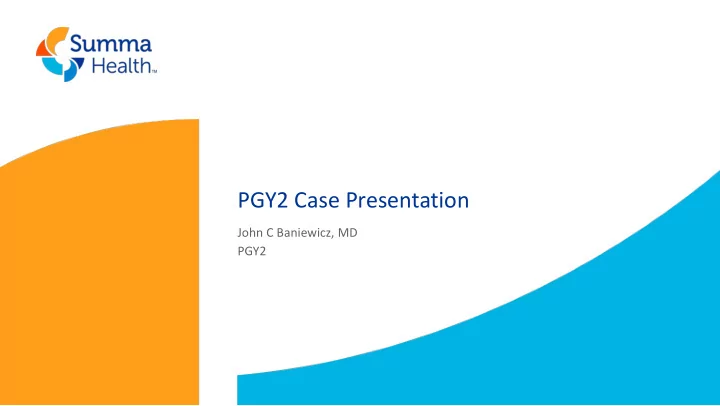

PGY2 Case Presentation John C Baniewicz, MD PGY2
Table of Contents - Initial Presentation - ER Work-up - Hospital Course - Discussion - Updates 2
INITIAL PRESENTATION JT is a 68-year-old female with PMH tobacco (1 pack/daily for 30 years) and marijuana abuse but otherwise had not seen a doctor in 15-20 years that presented to ACH ED with a roughly one-week history of nausea, vomiting, and decreased appetite with associated cramping lower abdominal pain with intermittent fevers and chills. Denied any other associated symptoms, including constipation, diarrhea, cough, shortness of breath. 3
ER WORK-UP: - Vitals: HR 110, BP 137/87, RR 18, SpO2 - URINALYSIS 97% (Room Air) - Specific Gravity > 1.030 - BMP WNL - Negative Nitrite, Leukocyte Esterase - LFTs WNL - WBC 6-10 - CBC: WBC 22.0, Hgb 17.3, Hct 49.9, - Squamous Epithelial cells 3-5 Platelet 507 4
ER WORK-UP (continued): - CT ABDOMEN PELVIS - Left adrenal gland enlargement and hypertrophy with decreased attenuation. Adrenal metastasis can have this appearance, correlate clinically. - Mild right adrenal gland hypertrophy with decreased attenuation. - Perinephric stranding and edema without hydronephrosis. 5
ER WORK-UP (continued) - Patient with nausea, vomiting, cramping abdominal pain with tachycardia and WBC 22 as well as evidence of perinephric stranding on CT Abdomen Pelvis - Patient admitted for septic workup with concern for bilateral pyelonephritis. Infectious workup started - Started on vancomycin / cefepime - Started on mIVF - 6 06.01.2016
HOSPITAL COURSE - Infectious workup, including blood cultures x2, repeat UA and urine culture, respiratory PCR panel, procalcitonin x2 all negative. - WBC slowly down-trending back to WNL. - Unclear what / if we were treating, infectious workup and antibiotics stopped at this time. 7
HOSPITAL COURSE (continued): - Endocrinology consulted: Bilateral adrenal thickening. Unlikely to be malignancy with increased - attenuation. Workup: - - Dedicated adrenal CT - Evaluation for adrenal hyper-function, including pheochromocytoma , Cushing’s, hyperaldosteronism. TSH, urine catecholamines / metanephrines, renin / aldosterone, cortisol testing. 8
HOSPITAL COURSE (continued): CT ABDOMEN PELVIS - “The left adrenal gland again demonstrates a mass-like process - “There are now bilateral adrenal mass - measuring up to approximately 4.4cm. like processes, including a new process There is a new large right adrenal mass- on the right since two days ago. Both of like process since the exam from two days these demonstrate high attenuation ago, measuring up to 7cm.” without contrast washout. This corresponds to acute bilateral adrenal hemorrhage.” 9
HOSPITAL COURSE (continued): 10
HOSPITAL COURSE (continued): - Remainder of lab-work was normal. - Patient started on hydrocortisone with improvement in all symptoms and subsequently discharged home. - Etiology remained uncertain: CT Chest negative - HIV negative - QuantiFERON negative - 11
BILATERAL ADRENAL HEMORRHAGE - A form of adrenal insufficiency - Presenting symptoms: Hypotension / shock (> 90%) - Abdominal, flank, back, or lower chest pain (86%) - Fever (66%) - Anorexia, nausea, vomiting (47%) - Confusion / Disorientation (42%) - Abdominal rigidity / Rebound tenderness (22%) - 12
ADRENAL HEMORRHAGE / ADRENAL INSUFFICIENCY - Risk Factors: Anticoagulation, underlying coagulopathy - Sepsis, bilateral adrenal hemorrhage, and death have also been reported with certain infections: Escherichia coli - Mycoplasma pneumonia - Streptococcus pneumoniae - Staphylococcus aureus - - Consider Waterhouse-Friderichsen syndrome (menigococcemia) if patient has fever and petechiae. 13
ADRENAL HEMORRHAGE / ADRENAL INSUFFICIENCY - TREATMENT: If patient is in adrenal crisis, hydrocortisone IV is preferred. - For chronic replacement, hydrocortisone BID or TID is still preferred. - - Can use prednisone, prednisolone, or dexamethasone for once-daily dosing if compliance is an issue. 14
UPDATES - Etiology of our patient’s adrenal hemorrhage remains unclear. Following with endocrine. - Remains on hydrocortisone BID - Being evaluated for pheochromocytoma 15
QUESTIONS? 16
Recommend
More recommend